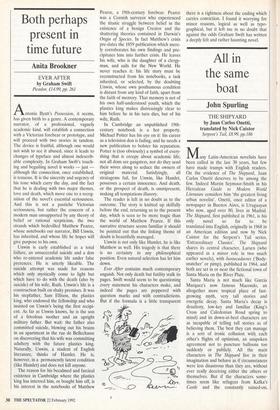Both perhaps present in time future
Anita Brookner
EVER AFTER by Graham Swift Picador, f14.99, pp. 261 Antonia Byatt's Possession, it seems, has given birth to a genre. A contemporary narrator, of a professional, vaguely academic kind, will establish a connection with a Victorian forebear or prototype, and will proceed with two stories in tandem. The device is fruitful, although one would not wish to see it abused, since it leads to changes of typeface and almost indescrib- able complexity. In Graham Swift's touch- ing and beguiling novel it works — just although the connection, once established, is tenuous. It is the sincerity and urgency of his tone which carry the day, and the fact that he is dealing with two major themes, love and death, which move one to a recog- nition of the novel's essential seriousness. And this is not a pastiche Victorian seriousness, but rather the concern of a modern man unsupported by any theory of belief or rational scepticism, the two strands which bedevilled Matthew Pearce, whose notebooks our narrator, Bill Unwin, has inherited, and whose life he hopes will give purpose to his own.
Unwin is early established as a total failure, an unsuccessful suicide and a don who re-entered academic life under false pretences. He is utterly likeable. The suicide attempt was made for reasons which only mystically come to light but which have to do with the death (also by suicide) of his wife, Ruth. Unwin's life is a construction built on shaky premises. It was his stepfather, Sam Ellison, the plastics king, who endowed the fellowship and who insisted on Unwin's being the first recipi- ent. As far as Unwin knows, he is the son of a frivolous mother and an upright military father. But wait: the father also committed suicide, blowing out his brains in an apartment in the rue de Bellechasse on discovering that his wife was committing adultery with the future plastics king. Naturally, Unwin, a student of English literature, thinks of Hamlet. He is, however, in a permanently latent condition (like Hamlet) and does not kill anyone.
The reason for his becalmed and farcical existence in Cambridge where the plastics king has interred him, or bought him off, is his interest in -the notebooks of Matthew
Pearce, a 19th-century forebear. Pearce was a Cornish surveyor who experienced the titanic struggle between belief in the existence of a benign Creator and the shattering theories contained in Darwin's Origin of Species. In fact Matthew's crisis pre-dates the 1859 publication which mere- ly corroborates his own findings and pre- cipitates him into further crisis. He leaves his wife, who is the daughter of a clergy- man, and sails for the New World. He never reaches it: his life story must be reconstructed from his notebooks, a task inherited, or selected, by the doubting Unwin, whose own posthumous condition is distant from any kind of faith, apart from the faith of memory. That memory is not of his own half-understood youth, which the plastics king makes distressingly clear to him before he in his turn dies, but of his wife, Ruth.
In Cambridge an unpublished 19th- century notebook is a hot property. Michael Potter has his eye on it: his career as a television don is fading, and he needs a new publication to bolster his reputation. Potter is (too obviously) a symbol of every- thing that is creepy about academic life; not all dons are gangsters, nor do they send their wives along to seduce the owners of original material. Satisfyingly, all stratagems fail, for Unwin, like Hamlet, possesses a certain innocence. And death, or the prospect of death, is omnipresent, making all temptations illusory.
The reader is left in no doubt as to the outcome. The story is knitted up skilfully before the end, returning us to the present day, which is seen to be more tragic than the world of Matthew Pearce. If this narrative structure seems familiar it should be pointed out that the linking theme of doubt is beautifully managed.
Unwin is not only like Hamlet, he is like Matthew as well. His tragedy is that there is no certainty in any philosophical position. Even natural selection has let him down.
Ever After contains much contemporary anguish. Not only death but futility stalk its pages. Swift would seem to be questioning every statement his characters make, and indeed the pages are peppered with question marks and with contradictions. But if the formula is a little transparent fr-
there is a rightness about the ending which carries conviction. I found it worrying for minor reasons, logical as well as typo- graphical, but it left me in no doubt that against the odds Graham Swift has written a deeply felt and rather haunting novel.


















































 Previous page
Previous page